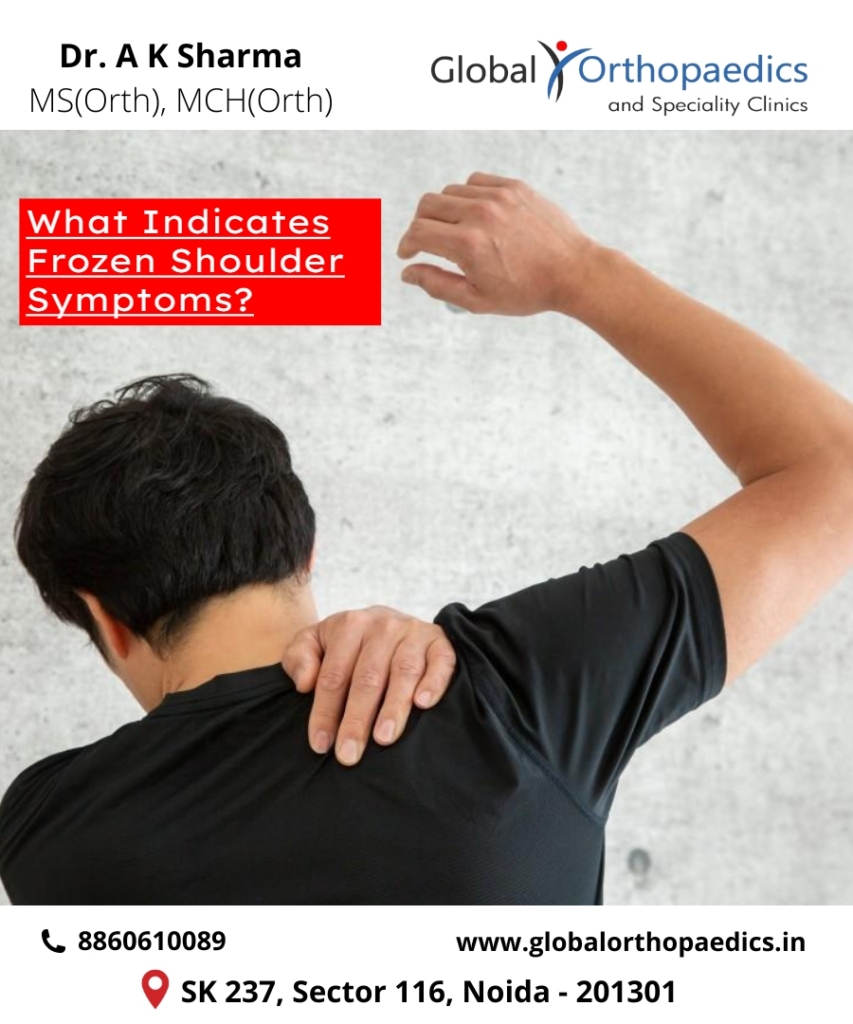Shoulder discomfort and stiffness are common symptoms of frozen shoulder, also known as adhesive capsulitis of the shoulder. Shoulder motions become restricted, perhaps becoming totally rigid or “frozen.”

Patients have discomfort and stiffness in their shoulders that lasts for several weeks at a time. It is believed to be caused by unyielding tissue in the shoulder capsule that resembles scar tissue. If therapy is not received, the symptoms normally go away, but it can take up to two or three years and still result in residual stiffness. Let’s learn the most typical signs of a frozen shoulder in this blog:
– Stiffness in the shoulder’s surrounding area. Usually, only one shoulder is affected at a time.
– Severe pain in and around the shoulder that limits daily activities, especially at night. Lying on the afflicted shoulder exacerbates the pain and may make it difficult to fall asleep.
– Restricted range of motion, making routine tasks difficult, such as putting on a bra for women or tucking in a shirt for men.
– Which shoulder is affected—the dominant or non-dominant shoulder—determines the kind, severity, and resulting disability.
Most cases of frozen shoulders usually progress gradually over weeks or months, with symptoms getting worse. The evolution of frozen shoulder is commonly divided into three stages by doctors, each of which causes varying degrees of pain and stiffness and usually lasts one to three months. Depending on the stage, frozen shoulders can have different symptoms.
A frozen shoulder can occur in three stages: the freezing stage, the frozen stage, and the thawing stage.
During the freezing stage, the shoulder becomes immobile and the surrounding tissue begins to hurt noticeably. During the freezing stage, the discomfort can get really bad, and at this point, stiffness can start to get really bad.
Although a stiff shoulder is a hallmark of the frozen stage, it is no longer as uncomfortable, especially when at rest. The shoulder capsule’s thickness and scarring restrict range of motion and hurt when reaching or straining.
The shoulder’s range of motion may improve during the last phase of thawing, although discomfort may still flare up sometimes, particularly at night when sleeping on the injured shoulder.
The ‘frozen’ stage is the distressing part. This usually lasts for two to nine months. Typically, pain is the initial symptom. Then, stiffness and mobility restriction also progressively worsen. Usually, the discomfort is greatest at night and when you’re lying on the side that is afflicted.
The ‘frozen’ stage is characterized as stiff and/or sticky. This usually lasts for four to twelve months. Although the discomfort progressively subsides, stiffness and movement restrictions persist and may even worsen. Your entire range of motion is impacted. Nonetheless, the arm’s outward rotation is typically the movement that is most negatively impacted. Since they are not used as frequently as they formerly were, the muscles surrounding the shoulder may atrophy slightly.
The ‘thawing’ step is the recuperation stage. Usually, this lasts for one to three years. Over time, the stiffness and soreness subside and movement gradually gets back to normal—or almost normal. Symptoms frequently make it difficult to do daily activities including driving, getting dressed, or sleeping.
The intensity and duration of symptoms vary greatly. The symptoms generally last for two to three years if left untreated. It’s substantially shorter than this in certain situations. A small percentage of patients experience symptoms for several years.
Conclusion:
Frozen shoulder, or adhesive capsulitis, causes stiffness and pain in the shoulder due to tissue tightness. Symptoms progress through freezing, frozen, and thawing stages, lasting up to three years untreated. If you want proper treatment of frozen shoulder, then consult with Dr. Ashok Kumar Sharma – the best orthopaedic doctor in Noida at Global Orthopaedics and Speciality Clinics. Book an appointment by calling on 8860610089 or visit the clinic at SK 237, Sector 116, Noida.


